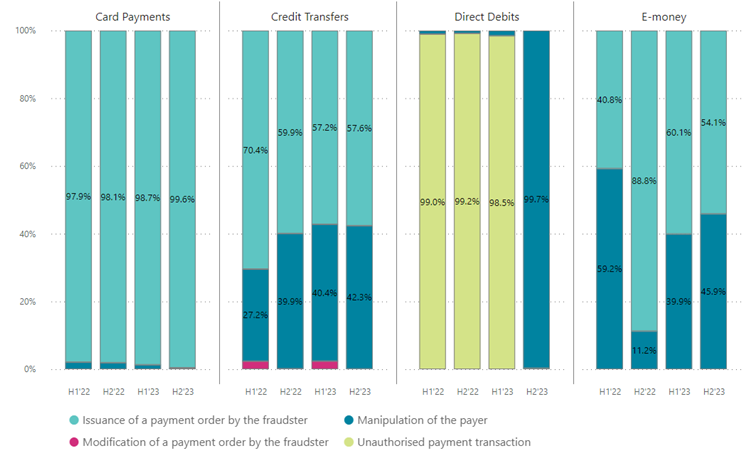Central Bank of Ireland publishes new data on Irish payment fraud
24 January 2025
Press Release

The Central Bank of Ireland today (24 January) published a new Behind the Data (BTD) paper on Irish payment fraud statistics. This BTD features insights on payments fraud in 2022 and 2023 in Ireland across primary payment methods including credit transfers, card payments, e-money and direct debits. It also examines how fraud varies across these payment methods, which types of frauds are most common, and how much money is lost to fraud.
Fraudulent payments are a growing concern in Europe, especially in the rapidly evolving digital marketplace. Fraudsters continually adopt new ways to exploit digital systems and bypass security measures, costing businesses and individuals millions each year.
The findings of this BTD reveal that although fraud is growing in Ireland, Irish fraud rates remain below EU averages across most payment methods with the exception of card payments.
Chart: Share of main fraud types (by value), by payment methods

Around 98% of card payment fraud by value was accounted for by ‘issuance of payment orders by the fraudster’. This occurs where fraudsters use stolen card, account or personal information for a payment.
‘Manipulation of the Payer fraud’ occurs where a fraudster gains trust by social engineering or impersonation and convince the payer to make payments to them is evident in credit transfers and e-money payment. In fraudulent credit transfers, payer manipulation fraud rose from 27% in the first half of 2022 to 42% by the end of 2023.
‘Unauthorised payment transactions’ is more specific to direct debits where a fraudster obtains customer information and set up mandates without the authorisation of the payer. Over 99% of all fraudulent direct debits were related to such fraud with an exception in second half of 2023 due to a once off incident recorded in this category.
‘Modification of Payment order by fraudster’ occurs where a fraudster intercepts and modifies a legitimate payment order. It is rare (less than 2 % of all fraud by value) and observed only in credit transfers.
Approximately 60% of the value of fraud is made through credit transfer, although these transactions only accounted for 4% of the total number of fraudulent transactions. This reflects the fact that credit transfers are often used for large value payments compared with other payment methods in Ireland. Credit transfer fraud amounted to €70m in 2023, with 24,000 transactions.
The BTD also reveals that the proceeds from fraudulent payments are predominantly transferred to accounts located outside Ireland. Incidents of fraud are more prominent when measures such as the EU’s strong customer authentication (SCA) are not in place.
The data also shows:
- The total value of fraudulent payments rose by 26% in 2023, increasing to €126m from €100m in 2022.
- The rate of fraud in Ireland as a share of all transactions is low. By value the rate is 0.001%, and by volume the rate is 0.01%.
- Card payment fraud rate is by far the highest among payment method, with 0.034% of card payments by value being fraudulent.
- Around 50% of fraud in electronic payments by value were not authenticated via Strong Customer Authentication, amounting to €52 million in 2023
- Online card payments made up 86% of the total value of card fraud in 2023, amounting to €37.4m
- The value of money remittance frauds has more than tripled from €2.5m in 2022 to €8.2m in 2023.
- Approximately 60% of the total value of fraud across 2022-2023 involved cross border payments, amounting to € 77m in 2023 and € 64m in 2022.
Combatting fraud in the financial system is a priority for the Central Bank, working closely with law enforcement, other State agencies and peer regulators. Where it identifies criminal activity taking place in the financial system, the Central Bank works with An Garda Siochána and other agencies who lead criminal investigations and prosecutions.
In 2024, the Central Bank launched a campaign to help consumers avoid scams. Further information on how to avoid scams is available at www.centralbank.ie/scams and consumers can call us on 0818 681 681.
For information on how to avoid fraud please see: www.centralbank.ie/scams
ENDS
Notes to the Editor
The Central Bank intends to provide semi-annual updates on payment fraud statistics, including linking these to the wider European data publications. This will allow for more transparency in this space and allow trends to be monitored.